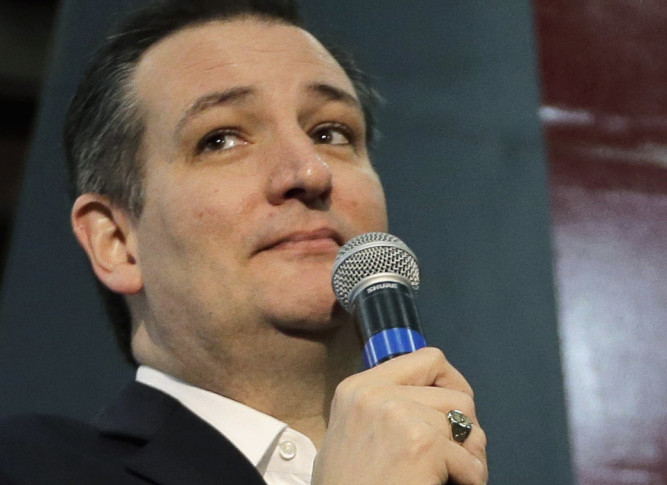JUNEAU, Alaska — U.S. Sen. Ted Cruz won the Republican presidential preference poll in Alaska late Tuesday, edging national GOP front-runner Donald Trump.
A high-profile endorsement from former Alaska Gov. Sarah Palin couldn’t deliver the state for Trump.
Cruz, a U.S. senator from Texas, edged the national GOP front-runner in Alaska for his third win of Super Tuesday. Trump was still the night’s big Republican winner with victories in seven states. U.S. Sen. Marco Rubio of Florida, who finished third in Alaska, won one state.
The other two candidates on Tuesday’s ballot in Alaska— John Kasich and Ben Carson — did not garner enough support to win any delegates.
The Alaska GOP reported high voter turnout that exceeded 2012 levels as thousands of Alaskans decided which of the remaining GOP presidential candidates would get their support. Party spokeswoman Suzanne Downing said in an email that volunteers manning polling sites were somewhat overwhelmed by the “unbelievable” turnout.
Some sites saw long lines, including the convention center that served as the lone polling location in Juneau, where dozens of people, including state legislators, lobbyists and Alaska’s first lady, waited their turn to vote for one of the five candidates on the ballot — Trump, Cruz, Rubio, John Kasich and Ben Carson. First lady Donna Walker declined to say who she supported.
State Sen. John Coghill, a Republican from North Pole, wasn’t shy in declaring his support for Cruz, seeing Cruz as closest to his own philosophy. He said Cruz and Rubio — but Cruz especially — seem to be more supportive of states’ rights. Coghill is among the state legislators who have been concerned about federal overreach. He said he would support whomever the Republican nominee winds up being.
In Anchorage, Mary Heiligenthal said she takes her aunt with her to all political events. The late Ramona Poeple, of Orange, California, counted former first lady Nancy Reagan as a friend, Heiligenthal said.
She wore her late aunt’s necklace and jacket and carried her purse, all festooned with elephants, the symbol of the Republican party. Heiligenthal, who said she’s in her 70s, said she voted for Donald Trump because he has shaken things up.
“I am for him 100 percent. I believe my auntie would have been for him,” she said. “We need a change in our county. Some people may feel he is drastic, but maybe we need drastic.”
Jim Stephens, 72, a retired pastor who now works part-time in an Anchorage hardware store, compared the front-runner Trump to a schoolyard bully. Stephens supports Rubio, who he said probably has the best chance of winning against the eventual Democratic nominee.
“The things I’ve seen and heard of him, I believe that he has a better chance and more to offer,” Stephens said.
In Anchorage, Sarah Moody, a married mother of three who works in the contracting industry, said she is deeply rooted in her faith and likes how Carson carries himself. Moody, 34, said she thinks Carson, a retired neurosurgeon, “would display the type of behavior a president should display.”
Twenty-eight delegates were up for grabs and were to be allocated proportionately to how well the candidates do in the poll. Cruz picked up 12 delegates with the win, while Trump was close behind with 11 delegates. Rubio received five delegates. Carson and Kasich didn’t earn more than 13 percent of the total vote, the threshold to receive a delegate.
The poll was open only to Republicans, though people were allowed to register to vote as Republican onsite to participate. Unlike primaries in Alaska, which are run by the state, the preference poll was run by the state GOP. And unlike state-run elections, voters could wear buttons or other regalia putting on full display who their candidate of choice is.
Democrats will meet to make their choice later this month.
___
Associated Press reporter Mark Thiessen contributed to this report from Anchorage, Alaska.
Send questions/comments to the editors.


